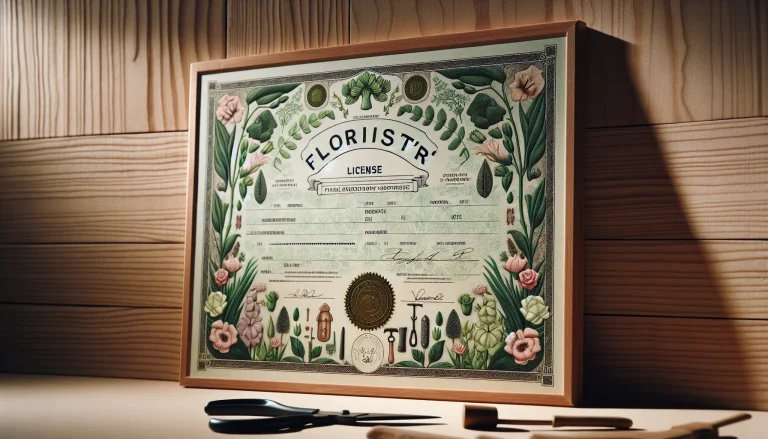Ever wondered, “Do I really need a florist license to sell flowers from home?” — you’re not alone.
Picture Betty’s Blossoms, a small home-based floral studio turning creativity into income. But like many local entrepreneurs, she faces one big question: are there legal rules she needs to follow?
In this guide, you’ll learn when a florist license is required, how it varies by state, and what steps to take before selling your first bouquet.
Have a flower business and want to maintain happy clients? Keep Flowers Fresh During Delivery
Request a free callbackMetrobi drivers are rated 4.97/5
Trusted by local businesses for:
- Background-checked professionals
- Specialized in business deliveries
- Same drivers for consistency
- 4.97/5 average delivery rating
Do You Need a Florist License to Sell Flowers from Home?
Understanding the General Rules and Regulations
Selling flowers from home isn’t just about beautiful bouquets — it’s about understanding the rules that keep your business blooming.
Licensing requirements vary by state and city, so it’s essential to check your local regulations and protect your venture with the right coverage. Discover how florist insurance can safeguard your home-based business.
If you’re selling flowers casually, you may not need a license. But once you start buying wholesale or scaling your operations, a florist license becomes crucial. Ready to take the next step? Learn how to start a successful flower business from scratch with our complete guide for new florists.
And don’t forget — efficient delivery can make or break your customer experience. Explore same-day flower delivery in New York City to boost satisfaction and grow your business faster.
🌿 Need help growing your floral business?
Talk to a Metrobi expert and discover how to streamline your deliveries and boost customer satisfaction.
US Florist Industry Market Size:
Over the last five years, the revenue of the florist industry has steadily increased at an average annual growth rate of 4.1%, reaching an approximate value of $8.6 billion in 2024.
The Role of a Seller’s Florist License
One common misconception is that a seller’s permit and a business license are the same. They’re not. A seller’s permit, sometimes known as a tax or resale permit, allows you to collect sales tax from customers, which you’ll then pay to the state.
If you’re selling flowers regularly and considering it as a business, obtaining a seller’s permit is often a good idea. This permit not only allows you to collect sales tax from your customers but also allows you to avoid paying sales tax when purchasing goods for resale. The process of obtaining a seller’s permit varies by state but typically involves filling out an application with your state’s Department of Revenue or its equivalent.
Annual Fee of Seller's Florist License:
To obtain a seller's permit, you're required to pay a fee of $90 per location or outlet annually.
The process may require you to provide information about your business, such as the nature of your business, the expected sales volume, and your business location. While some states do not charge for a seller’s permit or florist license, others might require a fee or bond.
Licenses for Florists
If you wish to sell cut flowers, you may need a florist license. A floral business may sell cut flowers, floral designs, and artificial flowers. Florists, or floral designers, design and arrange live and artificial flowers, and plants into floral displays. To become a retail florist, you must obtain a florist license. Discover the necessary steps for establishing your own floral store and turn your love for blooms into a prosperous enterprise with our straightforward guide.
The process of obtaining a florist license differs from state to state. In Louisiana, for example, you must pass an exam and register your business with the Louisiana Horticulture Commission. You will need to provide your account information and register your account with the Louisiana Secretary of State. Discover insurance coverage for florists to safeguard your floral venture and learn the steps to mitigate potential business hazards. If you’re looking to streamline the delivery process, consider leveraging dedicated services that can enhance your logistics. Finding reliable couriers in Chicago can significantly improve your business operations and ensure timely delivery of your beautiful floral arrangements.
Louisiana Florist License Exam Requirements:
In Louisiana, you must pay the $114 exam fee and pass the exam with a score of 70% or higher.
In addition to obtaining a florist license, you may also need to obtain a permit and register your business. Some states may charge fees to obtain these licenses and permits.
Florist License Renewal Costs:
Each year, licenses must be renewed, costing $100 for Retail and Wholesale Florists, and $90 per location for Cut Flower Dealers.
Online Courses for Floral Designers
If you’re interested in starting a floral business or are currently a florist looking to improve your skills, consider taking online courses. Online courses for floral designers are available and can help you develop the skills and tools you need to succeed in the floral industry. Some courses may even cover topics such as business tools, taxes, and registration. This comprehensive guide to establishing a website for florists further explores the selection of the perfect platform, the importance of captivating photography, and strategies for effectively promoting your online floral arrangements.
In summary, whether a florist license is necessary to sell flowers from home depends on several factors, including your location, the scale of your business, the types of flowers you’re selling, and whether you need a seller’s permit. By understanding the rules, you can ensure that your home-based flower business complies with all necessary legal requirements.
Metrobi is transforming flower deliveries
Specialized solutions for flower businesses:
- Flower-trained drivers
- Proper handling equipment
- Peak day delivery support
- 23% average cost reduction
Licensing Requirements for Online Flower Sales
The Shift to Online Sales
Thanks to technology, the tradition of selling flowers has dramatically shifted to digital. More people are getting comfortable with the idea of buying flowers from the comfort of their homes, escalating the growth of online flower shops by leaps and bounds. Such a trend impacts licensing requirements in various ways. Online sales can attract a more extensive customer base, which means there may be different rules that apply depending on where your customers are located – different states may have different licensing implications.
US Online Flower Shops Market Size:
Online flower shops in the US saw a 14.5% CAGR over the last five years, with revenue reaching $16.3 billion in 2023.
Further, with online sales, you’re not restricted to your local area; you can send flowers across the country, or even internationally (subject to necessary permits and legal procedures). This massively expands the potential market size but also brings in more complex licensing requirements. For instance, recall the legal issues faced by a Massachusetts-based online flower retailer for not having appropriate licenses to even sell cut flowers in Tennessee.
What about flower deliveries? In today’s world, having a reliable delivery system is essential for success. Consider integrating a courier service in Boston to enhance the efficiency of your operations and ensure customers receive their floral arrangements promptly.
Flower deliveries play a crucial role in the success of a home-based floral business. Here’s why:
-
Convenience for Customers: Offering delivery services makes it easy for customers to send flowers to their loved ones without leaving their homes. This convenience can significantly boost your sales and customer satisfaction.
-
Broader Reach: By providing flower delivery, you can expand your customer base beyond your immediate neighborhood. This allows you to reach a larger audience and increase your potential for growth.
-
Special Occasions: Flowers are a popular choice for celebrating special occasions like birthdays, anniversaries, and holidays. Providing reliable delivery services ensures that your customers can count on you to make their special moments even more memorable.
-
Building Relationships: Consistent and timely deliveries help build trust and loyalty with your customers. When people know they can rely on your service, they are more likely to become repeat customers and recommend your business to others.
-
Competitive Edge: Offering delivery services can set your business apart from others that do not. It adds value to your offerings and can be a deciding factor for customers choosing between different florists.
-
Brand Image: A professional and efficient flower delivery service, like Metrobi, enhances your brand image. It shows that you care about customer satisfaction and are committed to providing a complete service experience.
-
Increased Sales: Delivery services can lead to impulse purchases. Customers might be more likely to buy flowers for delivery when they can do so quickly and easily online or over the phone.
Profit Margin for Online Flower Delivery Services:
Profit margins in the online flower business typically hover around 70%.
The Operating Jurisdiction
An aspect that online flower sellers must bear in mind is the operating jurisdiction. Though operating from home, your sales are no longer confined geographically. So, it’s crucial to understand the licensing mandates of the locations your customers belong to.
Navigating Online Sales Regulations
It is vital to comprehend the different rules while selling flowers online. First, check whether your state requires a special permit or florist license to sell flowers. Next, look into the jurisdictions where most of your potential customers are located. In addition to local regulations, also understand the rules regarding interstate sales.
For instance, if you plan to sell beyond state borders, be informed about the USDA’s Plant Protection and Quarantine (PPQ) program that prohibits or limits the interstate transport of certain plants.
Moreover, being like perishable goods, how your flowers are packaged and sent can also be regulated. Issues like ethylene management or suitable packaging standards might be applicable. Also, remember that you’d need some sort of Occupational License to run a business from home.
Annual Growth Rate of Online Florists:
Online flower merchants are experiencing an annual growth rate of 11.8%.
As regulation complexity increases, having the right legal advice becomes essential. Consider consulting an attorney who specializes in online sales or small businesses for the best guidance.
Legal Considerations for Selling Plants from Home: Choose Your Business Location
Understanding the Legal Landscape
Navigating the legal maze when selling plants from your home can seem daunting. Zoning laws form a crucial aspect standing between your flower garden and the cash register. Residential areas have zoning restrictions limiting the type of businesses that can operate, directly affecting your plan to sell plants. Do make sure to investigate whether running a plant sales business from your home aligns with your local zoning laws. Wondering how to select the perfect location for your home-based flower business? Discover strategies for choosing a florist spot that aligns with local zoning laws and enhances your business’s visibility.
A second legal layer to peel away is business registration. Turning your green thumb into greenback requires you to register your business, regardless of its size. Registering your business clarifies your responsibilities when it comes to tax obligations and regulatory compliance fees. Make sure to pencil down these obligations as well as the related annual fees.
The Importance of Compliance
Let’s dive deeper into the maze of legalities. Understanding the consequences of not following the rules is essential. Ignoring zoning laws or failing to register your business can lead to legal actions, which means hefty fines or, in extreme cases, being forced to shut down your business. Following the law is cheaper and less stressful in the long run.
Beyond fines, neglecting legalities can damage your reputation among customers. Trust is crucial in business. A business that respects laws and regulations shows that it takes customer service seriously, which builds confidence among customers.
Dealing with legalities is as crucial as nurturing your plants. Selling flowers from home isn’t just about jumping on the success bandwagon; it’s about understanding the legal landscape you’re navigating. Navigating this landscape correctly can set your business up for success and keep you on the right side of the law.
Business Growth with Floral Endeavors
It’s been revealed that a florist license isn’t always required to sell flower from home. Certain factors, such as location, scale of operation, and conveyance mediums, do play their part.
Understanding these nuances is key to structuring your venture effectively, avoiding legal stumbling blocks, and ramping up profitability. This knowledge helps align your business with regulations, grow confidently, and focus on what you do best – bringing nature’s beauty to people’s homes.
So, now comes the exciting part. Dive into researching state-specific requirements regarding home-based floral designer businesses. Light the spark of entrepreneurship, and let it flourish amidst a garden of colors and fragrances.
As you start this journey, think about this – How are you planning to stand out in the ever-blooming, floral design industry?
Remember, every petal makes a difference. And in this case, knowledge is the water that helps your business grow.














